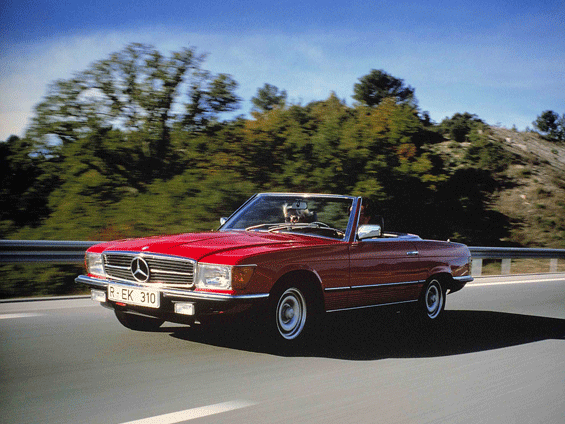With “Mercedes-Benz Young Classics,†Daimler AG is setting its sights on a new, promising business segment: the growing community of enthusiasts for classic cars of more recent vintage. These are passenger cars in production during the period from 1970 to around 1990. More and more of these Mercedes-Benz models have reached cult status, particularly in Europe and the United States. The demand for originality and the limited supply of well-preserved vehicles have driven the prices of vintage vehicles upward, which also applies to young classics. This means that driving pleasure can be accompanied by above-average financial returns. With “Mercedes-Benz Young Classics,†Daimler is closing the gap between new vehicle sales and the highly specialized classic car business of the Mercedes-Benz Classic Center in Germany and the USA.

With “Mercedes-Benz Young Classics,†Daimler AG is setting its sights on a new, promising business segment. On this foto: Mercedes-Benz SL-Roadster, model range 107, from 1971 to 1985. (Image: Mercedes_Benz)
Daimler has opened the first “Mercedes-Benz Young Classics Store†as a pilot project in the Mercedes-Benz Museum in Stuttgart. Here, customers are able to purchase, rent, insure, and even finance the young classics on offer. The store offers a variety of cars dating from the 1970s onwards, all in first-class condition. Interested parties can also view the range of available young classics online at http://www.mercedes-benz.com/young-classics.
Daimler also hopes to open up interesting new growth potential in Europe and the United States by expanding the spare parts business for the classic cars made by Mercedes-Benz. In doing so, Daimler is meeting the demand of classic car enthusiasts for original spare parts, while also expanding the current product range.
Young classics are vehicles between 15 and 30 years old. According to Germany’s Federal Office for Motor Vehicles, the market in Germany for young classics comprises approximately 6.6 million automobiles, 1 million of which are Mercedes-Benz cars, representing a market share of 15.6 percent.
Surveys by FIVA and Dekra show that around 60 percent of all owners of Mercedes-Benz young classics are between 21 and 50 years of age. Only 20 percent of them use those cars as their main vehicle.
Mercedes-Benz Young Classics is supported by the Business Innovation unit. The aim of the Business Innovation Team is to explore growth opportunities along the entire value chain. The focus is on unexploited potential within the company, as well as new business ideas relating to the current core business. Mercedes-Benz Young Classics demonstrates the breadth of the opportunities that exist for translating inherent strengths into additional, profitable growth.
Mercedes-Benz Young Classics will be presenting its product line at the Techno-Classica trade fair in Essen (April 1-5, 2009), the world’s largest fair for classic cars.

